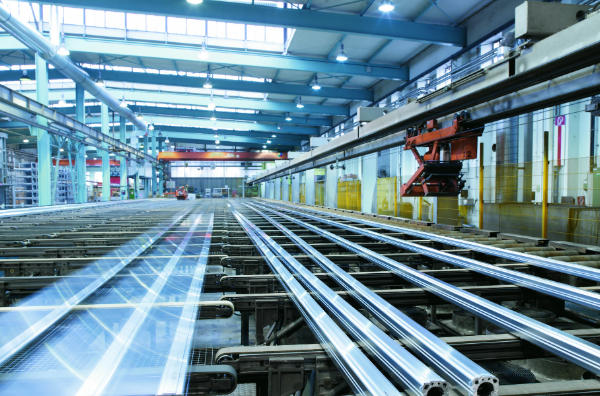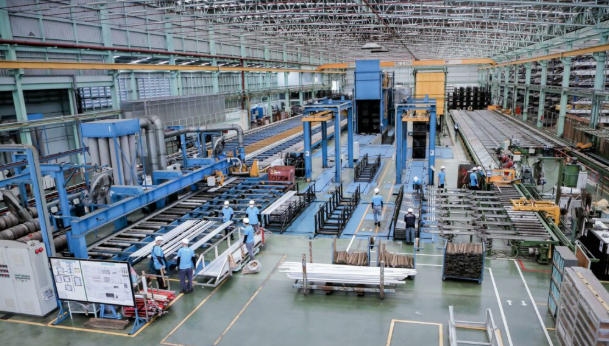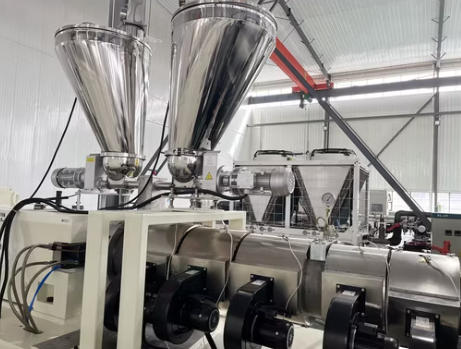Content Menu
● Why Choose Aluminum Extruder Manufacturers And Suppliers from Canada?
● Overview of the Aluminum Extrusion Industry in Canada
>> Historical Context and Development
>> Current Industry Structure
>> Leading Provincial Hubs
● Key Criteria for Selecting Aluminum Extruder Manufacturers And Suppliers
● Expanding Market Segments for Canadian Aluminum Extruders
● Technological Innovations and Industry Trends
>> Industry 4.0 and Digital Integration
>> Advanced Alloy Development
>> Enhanced Surface Treatment and Finishing
>> Sustainability and Circular Economy
● How to Establish Successful OEM Partnerships With Canadian Aluminum Extruder Manufacturers And Suppliers
● Conclusion
● FAQs
>> 1. What are the main benefits of working with Aluminum Extruder Manufacturers And Suppliers in Canada for overseas buyers?
>> 2. How do Aluminum Extruder Manufacturers And Suppliers ensure the quality of their products?
>> 3. What industries are the main users of products from Canadian Aluminum Extruder Manufacturers And Suppliers?
>> 4. Can Canadian Aluminum Extruder Manufacturers And Suppliers handle custom and complex extrusion projects?
>> 5. How can a buyer start the process of working with Canadian Aluminum Extruder Manufacturers And Suppliers?
The aluminum extrusion industry plays a vital role in Canada's manufacturing landscape and global supply chains. With aluminum's unique combination of light weight, strength, corrosion resistance, and recyclability, it has become indispensable across industries including automotive, aerospace, construction, electronics, and renewable energy. Canadian Aluminum Extruder Manufacturers And Suppliers stand out for their technical expertise, advanced manufacturing capabilities, and sustainability practices. This article provides a comprehensive and detailed overview of the aluminum extrusion sector in Canada, highlights the leading manufacturers and suppliers, explores the latest industry trends and innovations, and offers practical guidance on forming OEM partnerships. Whether you're a brand, wholesaler, or OEM seeking reliable aluminum extrusion sourcing from Canada, this resource is designed to inform your decisions and facilitate successful collaborations.

Why Choose Aluminum Extruder Manufacturers And Suppliers from Canada?
Canada offers several competitive advantages as a sourcing destination for aluminum extrusion:
- High-Quality Raw Materials: Canada is one of the world's largest producers of raw aluminum, benefiting from abundant bauxite resources and refined aluminum stocks supported by clean hydroelectric power.
- Advanced Technology and Expertise: Canadian extruders incorporate state-of-the-art extrusion presses, sophisticated die manufacturing, and precision machining to serve demanding client requirements.
- Environmental Sustainability: The use of hydro-powered electricity and a strong regulatory environment encourages greener manufacturing, contributing to lower embodied carbon in finished products.
- Compliance and Certification: Canadian producers adhere to stringent North American and international standards such as ASTM and ISO, simplifying import and regulatory compliance globally.
- Geographical Advantage: Proximity to major North American markets and efficient transportation infrastructure enable competitive lead times and logistics.
With these strengths, Canadian Aluminum Extruder Manufacturers And Suppliers are ideal strategic partners for international businesses seeking high-quality extrusions supported by rigorous quality control and technical service.
Overview of the Aluminum Extrusion Industry in Canada
Historical Context and Development
The evolution of aluminum extrusion in Canada dates back to the mid-20th century when industrial demand for lightweight materials accelerated. Extrusion technology enabled the production of complex profiles in high volumes, unlocking new possibilities for construction frameworks, transport components, and consumer products. Over decades, Canadian extruders have steadily invested in technology upgrades, energy efficiency, and product innovation to keep pace with changing market demands and global competition.
Current Industry Structure
Canada's aluminum extrusion industry is characterized by a healthy mix of large integrated companies and agile mid-sized suppliers. The former often provide comprehensive services from billet casting to finished component delivery, while the latter specialize in customized, complex, or low-to-medium volume production runs. This flexibility caters to a broad range of sectors from heavy infrastructure to niche automotive parts.
Leading Provincial Hubs
Key aluminum extrusion clusters are located in:
- Ontario: With its strong manufacturing base and industrial ecosystem, Ontario hosts several prominent aluminum extruders and downstream processors.
- Quebec: Quebec's proximity to raw material supply and hydroelectric power makes it central to large aluminum producers and extruders.
- Alberta and British Columbia: These provinces contribute to extrusion capacity with emphasis on renewable energy projects and construction applications.
Geographical positioning also facilitates easy access to shipping ports and rail networks critical for export-oriented suppliers.
Key Criteria for Selecting Aluminum Extruder Manufacturers And Suppliers
When sourcing aluminum extrusions from Canada, buyers should carefully evaluate potential partners on multiple dimensions:
1. Product Versatility and Customization Options
- Can the supplier produce the specific alloys, profile geometries, and surface finishes needed?
- Do they support custom tooling and die creation for bespoke projects?
- Are short runs and prototype orders accommodated?
2. Quality Assurance and Certifications
- Does the manufacturer hold international certifications like ISO 9001 (quality management) or ISO 14001 (environmental management)?
- Are there documented quality control procedures and testing reports available?
- How transparent is the supplier regarding process audits or factory visits?
3. Delivery and Logistics
- Are lead times clearly communicated and reliable?
- Can the supplier manage international shipping complexities, including export paperwork and customs clearance?
- Do they offer Just-In-Time (JIT) delivery, Kanban systems, or other lean inventory solutions?
4. Sustainability Credentials
- Is the aluminum sourced from recycled material or produced with low-carbon processes?
- Can the supplier provide certificates of origin and compliance relevant to environmental standards?
5. Technical Support and After-Sales Service
- Does the supplier offer design assistance or engineering consultation?
- What level of support exists post-purchase for troubleshooting or adjustments?
6. Financial Stability and Reputation
- What is the supplier's market standing, client base, and financial stability?
- Are there references or testimonials from existing international customers?
Careful assessment against these factors helps mitigate risks and build enduring supplier partnerships.
Expanding Market Segments for Canadian Aluminum Extruders
The scope of applications for aluminum extrusions in Canada continues broadening, influenced by emerging technologies and sustainability imperatives:
- Electric Vehicles (EVs) and Transportation: Aluminum extrusion is vital for lightweight vehicle frames, battery housings, and heat sinks. Canadian suppliers are innovating thinner-walled, higher-strength alloys for EV and aerospace markets.
- Renewable Energy Infrastructure: Aluminum extrusions serve as structural components for solar panel frames and mounting racks, wind turbine parts, and energy storage units.
- Construction and Architecture: Facade systems, window frames, curtain walls, roofing, and structural supports rely heavily on custom aluminum extrusion profiles.
- Electronics and Electrical Distribution: Extruded heat sinks, conductive bars, and enclosure profiles feature prominently in consumer electronics and energy distribution equipment.
The growing demand for customized solutions in these segments drives both capacity expansion and material science research among Canadian extruders.

Technological Innovations and Industry Trends
Industry 4.0 and Digital Integration
Leading Canadian aluminum extruders embed automation and data analytics into their processes:
- Real-time monitoring of extrusion presses ensures consistent quality and minimizes downtime.
- CAD/CAM software enables precise die design and rapid prototyping.
- Supply chain digitization enhances order tracking, inventory management, and just-in-time delivery protocols.
Advanced Alloy Development
R&D efforts focus on new alloys offering superior strength-to-weight ratios, corrosion resistance, and electrical conductivity. Innovations also target improved extrusion formability, allowing for more intricate profile shapes.
Enhanced Surface Treatment and Finishing
Beyond traditional anodizing and painting, Canadian manufacturers incorporate powder coating, electroplating, and specialized treatments to boost product aesthetics, durability, and functionality against specific environmental exposures.
Sustainability and Circular Economy
With global emphasis on carbon footprint reduction, Canadian extrusion firms increasingly source recycled aluminum and optimize energy use. Some participants participate in closed-loop recycling programs, facilitating aluminum reuse without degrading quality.
These trends collectively enable Canadian suppliers to support sophisticated customer demands while maintaining competitive advantages.
How to Establish Successful OEM Partnerships With Canadian Aluminum Extruder Manufacturers And Suppliers
Developing OEM partnerships requires strategic collaboration built on trust, clear communication, and alignment of objectives:
- Project Definition: Share comprehensive technical drawings, functional requirements, anticipated volumes, and timelines from the outset.
- Prototype Development: Request samples or pilot extrusions to validate specifications and refine product concepts.
- Contract Negotiation: Agree on pricing structures, lead times, minimum order quantities, quality checks, and intellectual property safeguards.
- Certification and Compliance: Confirm the availability of requisite documentation to meet exporting country regulations and client standards.
- Ongoing Communication: Utilize digital collaboration tools for project updates, design iterations, and issue resolution.
- Long-Term Planning: Build forecasts and develop contingency plans together to accommodate fluctuating demand or design changes.
Effective partnerships can yield faster innovation cycles, cost reductions, and enhanced product quality — key advantages in competitive international markets.
Conclusion
Canada's Aluminum Extruder Manufacturers And Suppliers are globally recognized for exceptional quality, innovation, and dependable services. Anchored by abundant natural resources and powered predominantly by clean hydroelectric energy, Canadian extruders combine sustainability with cutting-edge technology to deliver superior aluminum extrusion products. Their broad industry expertise across automotive, aerospace, construction, electronics, and renewable energy sectors ensures versatile solutions tailored to diverse applications.
For overseas brands, wholesalers, and OEM producers seeking reliable partners, Canadian manufacturers offer a compelling proposition—one defined by technical excellence, rigorous quality assurance, environmental consciousness, and efficient logistics. By carefully selecting the right Canadian extrusion supplier and fostering strong OEM partnerships, businesses can benefit from enhanced product performance, scalable manufacturing, and smooth international cooperation.
As market demands evolve towards lighter, stronger, more sustainable materials, the Canadian aluminum extrusion industry is poised to maintain and expand its role as a critical enabler of innovation worldwide.

FAQs
1. What are the main benefits of working with Aluminum Extruder Manufacturers And Suppliers in Canada for overseas buyers?
Canadian suppliers offer reliable quality, advanced manufacturing capabilities, sustainable production processes, and strong alignment with international regulatory standards. This makes them ideal sourcing partners for global OEMs and wholesalers.
2. How do Aluminum Extruder Manufacturers And Suppliers ensure the quality of their products?
They implement rigorous quality assurance protocols, hold certifications such as ISO 9001 and ISO 14001, conduct continuous testing (including dimensional, mechanical, and surface quality), and maintain transparent audit and traceability systems.
3. What industries are the main users of products from Canadian Aluminum Extruder Manufacturers And Suppliers?
Major industries include automotive and electric vehicles, aerospace, construction and architecture, renewable energy, electronics, and consumer goods.
4. Can Canadian Aluminum Extruder Manufacturers And Suppliers handle custom and complex extrusion projects?
Yes, most leading Canadian extruders offer custom die manufacturing, rapid prototyping, precision machining, and finishing services tailored to complex technical requirements across diverse alloys and profile configurations.
5. How can a buyer start the process of working with Canadian Aluminum Extruder Manufacturers And Suppliers?
Start by reaching out to potential suppliers with detailed product specifications or designs, request technical consultations and sample quotations, verify certifications, and consider site visits or factory audits for high-value projects.






















